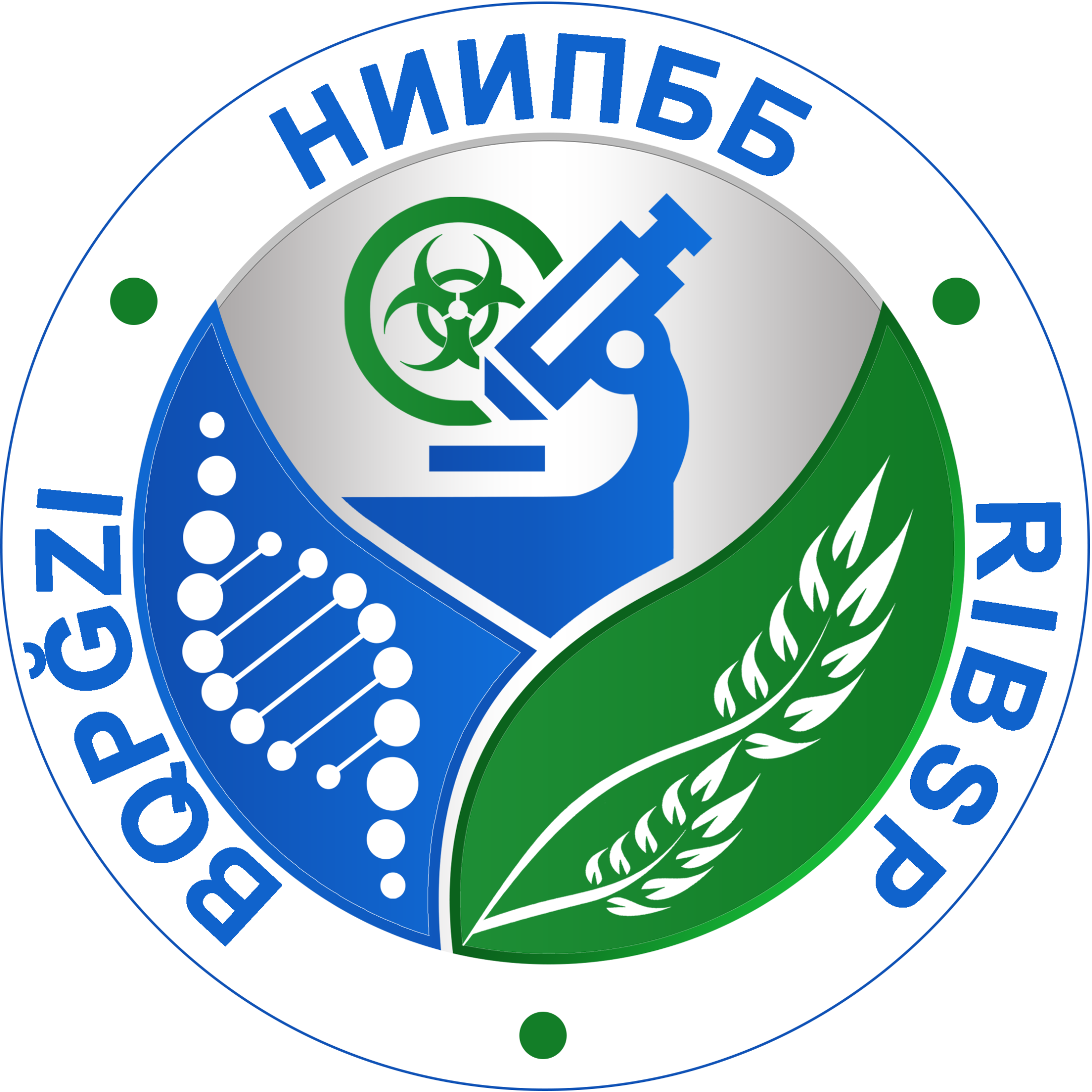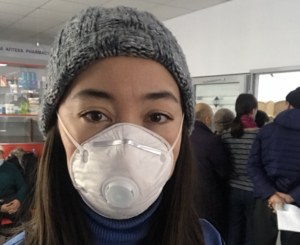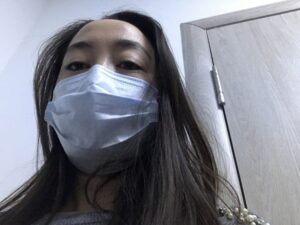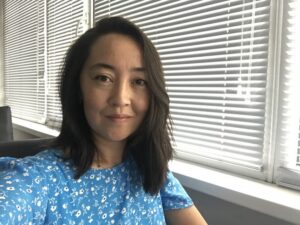RIBSP scientists knew about the Tengrinews.kz journalist’s participation Aynash Ondiris in the article of media “180 days in the experiment: How I participated in the phase III clinical trial of QazVac”.
RIBSP thanks Ainash Ondiris for her courage and active citizenship. Her contribution, as well as the contribution of other volunteers in clinical research, is invaluable.
Scientists-developers of RIBSP, volunteers, medical workers who participated in clinical trials all solved one problem together. Develop and test the QazVac vaccine as soon as possible to save the lives and health of their compatriots.
https://tengrinews.kz/opinion/180-dney-eksperimente-ya-uchastvovala-iii-faze-klinicheskogo-1107/
“On December 26, I was given the first injection of a Kazakh vaccine as part of an experiment. That is, I signed up to participate in phase III clinical trials (CI) of Kazakhstan’s QazVac vaccine (then it was also called QazCovid-in). Besides me, 3 thousand more people participated in the study. Exactly 180 days we were in the experiment and were forbidden to disclose any information about the course of the CI.
On June 23, the clinical trial of my group officially ended. It’s time to tell everything in more detail.
This publication does not carry advertising and agitation for the Kazakh vaccine QazVac. Here is the personal experience of a volunteer who decided to take part in a test of a domestic vaccine in order to observe the process from the inside.
I am a journalist and have been following all the news about the coronavirus from the very beginning. When I first learned that we were developing our own vaccine against Covid, I took it, to put it mildly, skeptically. Well, what can be done in Kazakhstan? Considering that the best minds of mankind in the USA and Europe are fighting over a vaccine against a new disease and huge amounts of money are being pumped into research.
And in December it became known that volunteers were being recruited to participate in phase III clinical trials of the Kazakh vaccine. Three thousand volunteers were needed for this. Professional curiosity took over, and I decided to try and take part in the experiment.
How were the volunteers selected?
Clinical studies were conducted on the basis of two polyclinics in Almaty and Taraz. Recruitment of volunteers in Almaty began on December 26. On that day, everyone was asked to come to the reception from 6 am, on an empty stomach and with an identity card.
It’s my first day at the clinical base. Almaty, December 26, 2020
And to my amazement, there were a lot of people who wanted to. Just to register, I had to stand in a huge queue. The volunteer must then give their consent to participate in the clinical trial by signing an informed consent form. But that’s not all.
All volunteers underwent medical examination
First of all, we passed an express coronavirus test and an electrocardiogram (ECG). Those who have already had coronavirus or had heart problems were not allowed to participate in the study. At this stage, several people from our group did not qualify. And, it seems, they were even upset.
Next, everyone took blood from a vein for biochemical analysis, passed a pregnancy test, urine, followed by a mandatory medical examination by a therapist. The doctor asked if there were any chronic diseases, allergies and bad habits, measured the pressure. At this stage, the volunteers were assigned an ordinal number. They signed a contract with us and gave us a diary of self-observation.
Everyone was forbidden to take photos and videos of the process, these are the rules of clinical research
An informed consent was given to participate in the experiment, where all the risks and consequences were indicated. It is also not allowed to publish its contents verbatim. But the basic information about QazVac is already publicly available on the Internet and in the media. The WHO website also has information about clinical trials of the Kazakh vaccine.
What were the requirements for volunteers?
The clinical study involved men and women from 18 to 80 years old.
Main requirements:
No history of COVID-19 diagnosis.
Participants should not have had chronic infections and any allergic reactions.
People with alcohol and drug addiction, mental disorders, serious endocrine and renal disorders,
people with chronic diseases of the heart and circulatory system,
pregnant and lactating women were not allowed to participate in the tests.
Remuneration — 200 thousand tenge
I was surprised by the number of volunteers. I expected to see a lot less willing. As I said, just to register, I had to wait in line for a couple of hours. The crowd on the first day of recruitment was impressive. Judging by the conversations, some people came from far away. Someone was with whole families. Anyway, an unimportant role here probably was monetary remuneration.
They promised to pay 200 thousand tenge for participation in the clinical trial. However, it turned out on the spot: they won’t give this amount to their hands right away. It was issued in parts for 6 months — in four tranches. And with the deduction of all taxes and social payments, something about 160-168 thousand tenge came to hand. At this stage, some people have already changed their minds themselves. But only a small number of people retreated.
Everything was done in one day
Considering the large number of people, all the preliminary medical examinations took half a day. The first injection was made on the same day, December 26.
By the way, we were warned that some undesirable reactions may develop after the injection.
What adverse reactions may develop after vaccination:
Fever,
cough,
headache,
shortness of breath,
sore throat,
general weakness,
rash,
abdominal pain
and possibly even diarrhea and vomiting.
Fortunately, I didn’t notice any of these reactions. Maybe an hour after the vaccination, I felt something like a slight choking in my throat. However, it passed quickly. I put it down to excitement.
We were warned not to drink alcohol during the first week after the injections. Also, during the entire study period, we were asked to refrain from taking painkillers and antipyretic medications. Well, planning a pregnancy for the entire time of participation in the CI was also not recommended.
What is the QazVac vaccine?
QazVac is an inactivated (dead) vaccine against COVID-19. The vaccine was produced on the basis of an inactivated, purified strain of the SARS-CoV-2 coronavirus. The drug is manufactured on the basis of the Research Institute of Biological Safety Problems.
The full name of the clinical trial is as follows: a multicenter, randomized, blind, placebo-controlled phase III clinical trial to assess the preventive efficacy, safety and immunogenicity of QazCovid-in (QazVac).
The vaccine being developed is intended for intramuscular administration, it can ensure the formation of an immune response in vaccinated volunteers aimed at curbing the reproduction of coronavirus, which is assessed as a potential benefit.
During our clinical study, it was determined how effectively this vaccine fights COVID-19.
What do the developers themselves say about the QazVac vaccine?
Previously, the vaccine has passed preclinical tests on laboratory animals: white mice, Syrian hamsters, ferrets, rabbits, rats and at the last stage — on monkeys. In September, it began to be tested in humans.
Here is what one of the developers, professor of the Research Institute of Biological Safety Problems Berik Khairullin, said earlier about the vaccine: “This is an inactivated vaccine, purified, and concentrated with the addition of an adjuvant— aluminum hydroxide. This is the most proven technology. This technology is more than 70 years old, unlike mRNA technologies and the same adenovirus vector technology. That is, when people ask about the long-term consequences, this type of vaccine is the most proven. The same technology was once used to create a vaccine against influenza, polio, tick-borne encephalitis, hepatitis, and they have been used for many decades, and all the data on the effect on the human body are fully known. And this vaccine was developed using this most proven technology.”
Another developer, Lesbek Kutumbetov, assured that the vaccine is harmless:
“In September, the first phase of clinical trials was launched, where 44 volunteers participated, these trials took place within 42 days. They ended very well. The vaccine showed a positive result. It is harmless to people,” Kutumbetov said.
200 people participated in the second phase of clinical trials. It ended in November. “200 volunteers participated there, they, just like in the first case, were vaccinated and monitored for 42 days. Observation consists of clinical observation, that is, the general condition of the person, the general local condition where the vaccine was administered. The first few hours they watch people, how they feel, what deviations there may be, and so on. Every week people come, donate blood and talk about their condition. At the same time, tissue immunity is determined by blood parameters, humoral immunity is determined,” Lespek Kutumbetov said.
By the way, all the scientists-developers were the first to be vaccinated with their vaccine, and, as the institute told, none of them got sick with coronavirus, although they are in direct close contact with the virus in the laboratory.
The developers stated that the safety and immunogenicity of the vaccine against coronavirus was proven at two stages. Of course, the final result should be shown by the final phase III clinical trials. Judging by the news, the expectations of the domestic vaccine are very high both among developers and the government.
What’s next?
On January 15, on the 21st day, I was given a second injection. In the first days, the injection site was slightly swollen and sore. In my case, there was no fever, no cough, no weakness. Everything is as usual.
We recorded information about how we felt in a special diary of self-observation.
The researchers gave us their phone numbers, where we could call if there were any health problems or if symptoms of coronavirus appeared. In WhatsApp created a special chat where we were reminded when we should come to the next appointment.
The period of participation in the clinical trial was 180 days, that is, exactly 6 months. During this time it was necessary to visit the clinic 5 times:
On the 1st day,
on the 21st day,
on the 42nd day,
on the 90th day
and on the 180th day of the study.
Every time when we visited the clinical base (center), we passed a medical examination, gave blood from a vein and urine. At the same time, the volunteer had the right to refuse further participation in the CI at any time.
Placebo or vaccine?
And finally – the most interesting. 600 volunteers out of 3,000 received not the vaccine itself, but a placebo empty. This is an ordinary saline solution. No one knew who would get the empty one and who would get the real vaccine, even the organizers of the study themselves. All this was determined by the method of blind choice.
For the purity of the experiment, I did not independently check the antibodies after vaccination, although there was a huge temptation. And for some reason, at first I was sure that I had been injected with a placebo, since there was no particularly serious reaction either after the first or after the second dose of the vaccine. The fact that I received a real vaccine was officially confirmed to me on the 180th, the last day of CI.
The day of revaccination with the second dose of the vaccine. Almaty, January 15, 2021.
Of course, I had some inner fear. And on the night before the second dose of revaccination, panic seized me in general: what if something goes wrong? (“My God, what am I doing?!”). As never before, I followed the latest news about different vaccines and about our vaccine, of course, first of all. I enlisted the support of familiar doctors with whom I could always consult, which was very important to me. And I was also very comforted by the fact that Minister Askhat Aimagambetov, Akim of Zhambyl region Berdibek Saparbayev and Yerlan Karin had previously been vaccinated with the same vaccine.
Cons and pros of the organization
And, of course, what I noticed in the organizational plan, which I can’t help but say.
Chaotic order. There were a lot of people on the first day. Only for registration I had to stand for almost 2 hours. The cramped room of the clinic, there was no question of maintaining the distance. There were also not enough seats provided, people spent half a day on their feet.
Medical control. We were told that in the first week the doctor would call and ask about the well-being of the volunteers. For all the time, the doctor called only 2-3 times.
Insurance. I was given an insurance policy, from which I learned that the amount of insurance payment in the event of my death or disability as a result of CI will cost to 500 thousand tenge. The amount is actually ridiculous. This gave reason to think, how much is our life worth? I really hope that none of the volunteers had to use this insurance.
As a plus, I can name: benevolence, responsiveness and patience of the organizers of the clinical trial. The main researcher, Professor Ilyas Kulmagambetov, personally communicated with the volunteers on the first and subsequent days and willingly answered all questions. His phone number is listed in all the documents that were given to us. That is, we could call him any day. It was very comforting and inspired confidence. The professor said that he was also vaccinated with the same vaccine, but a little earlier than all of us.
I am 180 days after the first vaccination as part of the CI. Consciousness is clear, well-being is normal, have antiviral protection against coronavirus. Almaty, June 25, 2021
Since April, the Kazakh vaccine has already been used for mass vaccination. The final data on the phase III clinical trials of Kazak and its specific performance indicators will be known soon, in July.
And I will find out my specific antibody titer in a couple of weeks. The organizers of the CI promised to provide this data to volunteers in the near future. In general, I feel fine. I also sent my relatives for mass vaccination, back in March. They, unlike me, were grafted by the Russian “Sputnik V”.
By the way, in February I found myself in contact with a friend who, a couple of days after our meeting, the whole family “rattled” to the covid hospital with pneumonia. I’m not infected, my friend is already fine too. Now I have confidence which the vaccine protected me from that infection. But I still continue to use the mask in crowded places, and the sanitizer is always with me.
Journalist Aynash Ondiris took part in the clinical study as a volunteer.”
On the eve of the professional holiday – the Day of Media Workers, SRIBSP expresses gratitude to the journalistic community for their conscientious work, high professionalism, and unwavering dedication to their chosen job.




